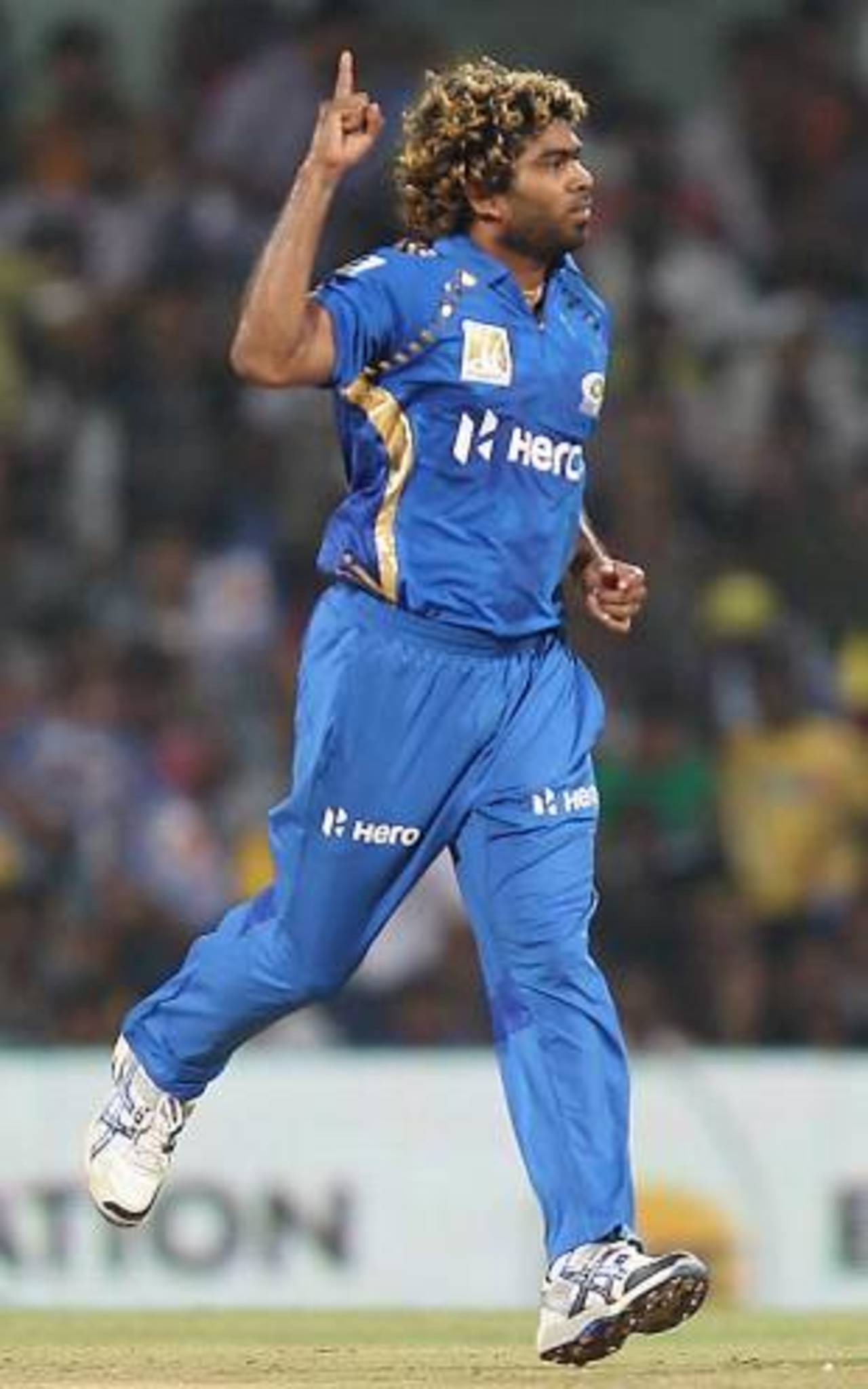Malinga solves Mumbai Indians' problems
Though they couldn't bat, couldn't field and conceded byes generously, MI finished with the biggest prize at franchise-level Twenty20
Nitin Sundar
Oct 10, 2011, 2:22 PM

Lasith Malinga won Mumbai Indians matches with both bat and ball • AFP
By the end of the Champions League, the Mumbai Indians post-match press conferences at the MA Chidambaram became as predictable as Groundhog Day. Harbhajan Singh would field questions on how his side had managed yet another unlikely win, overcoming their latest top-order funk and club-class fielding display. Lasith Malinga - Man of the Match against Chennai Super Kings and Somerset, and Player of the Tournament after the final - would sit aloof by Harbhajan's side, fiddling with his mobile phone, his bronze curls and all-pervasive tattoos saying more than he could ever convey in words.
One tattoo on Malinga's forearm spoke louder than all his other elements of bling. "Destiny says it all", it proclaimed sagely. Harbhajan might have curtailed his long, rambling explanations, and just pointed at it.
There was little surrounding the Mumbai Indians' campaign that suggested they could go all the way. They came into the tournament with the lowest billing among the IPL sides, without their captain, icon and best batsman, and several other first-choice players. Their stand-in skipper was going through his worst season at the highest level, and had to deal with his own exclusion from the Indian side midway through the tournament.
They invited ridicule by picking a side without Mumbai-ites, and with very few Indians, and then convincing the organisers to change the rules to provide them an injury handicap. They were further embarrassed when one of the injured players turned up elsewhere, sprightly enough to hit a match-winning 191 a week after being declared unfit for the Mumbai squad. Apart from becoming a PR-disaster, the fifth overseas player contributed little on the field, with Andrew Symonds enduring the tournament without quite figuring which end of the bat to hold. In a tournament where three centuries were hit, and four batsmen made over 200 runs, MI's highest run-getter managed 123.
The Super Kings could have beaten them, but MS Dhoni somehow clanged a simple stumping that would have closed the game, on a day when he effected four other dismissals. T&T should have beaten them, but Daren Ganga was somehow convinced to spread his field to a No. 11 batsman with two to defend off the last ball, before Denesh Ramdin somehow missed a run-out you would have backed most toddlers to pull off.
Two wins and a rain-out put Mumbai Indians unexpectedly in pole position, before their poor cricket caught up with them in the fourth, against New South Wales. Just when it seemed they would be pipped on the points table, T&T defeated the Cobras to leave MI's passage to the semi-finals unhindered. It seemed like one of the scripts for which the city is famous.
MI lifted their game marginally in the semi-final and final, but the fielding remained apologetic, and Ambati Rayudu's part-time wicket-keeping appalling. With 22 runs to defend in two overs against Somerset, Harbhajan tossed the ball to James Franklin, who isn't an end-overs first-choice option even for New Zealand. And it worked. MI's batting spluttered colossally in the final, as they subsided from 105 for 4 in the 14th over to 139 all out. RCB had the game in the bag once Tillakaratne Dilshan powered them to 38 for 0 in four overs, but almost inevitably MI found the escape route once again.
While fortune favoured them right through, Harbhajan did his bit with attractive captaincy and attacking bowling. Pollard contributed little with bat and ball, but remained electric on the field. Aiden Blizzard and Franklin, too, chipped in, but the real heroes for Mumbai were their unheralded Indians. At different stages in the tournament, Yuzvendra Chahal, Sarul Kanwar, Suryakumar Yadav, Abu Nechim and R Sathish raised their game. Malinga, quite simply, did everything else.
The imbalance between bat and ball in Twenty20s stems largely from the fact that a bowler is reduced to a mere four overs in the format. That didn't seem to affect Malinga, who had stumps in the cross-hairs every time he ran in, and routinely produced howitzers masquerading as yorkers. He took Mumbai's deficiencies in the field completely out of the equation: of his ten victims, eight were bowled and two were lbw. He also did his bit to alleviate MI's batting woes: he clouted more sixes, and finished with a higher batting average and strike-rate, than anyone else in his team.
And so it was, that though they couldn't bat, couldn't field and conceded byes generously, MI finished with the biggest prize at franchise-level Twenty20. Their triumph flies in the face of conventional Twenty20 logic; it came in a format made for batsmen, and where games are won and lost by fielding, without looking the part in either department. How do you explain that?
Perhaps Malinga's tattoo was right. Destiny did say it all.
Nitin Sundar is a sub-editor at ESPNcricinfo